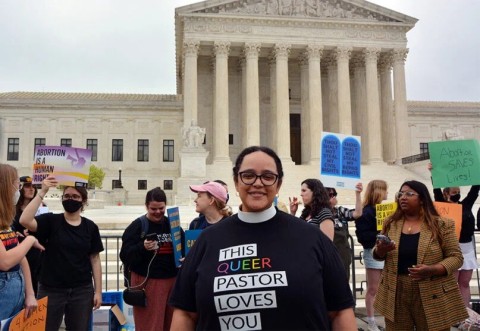Unitarian Universalists elect first woman of color, openly queer president

Sofía Betancourt in front of the Supreme Court in 2022. (RNS photo by Jack Jenkins)
A womanist theologian, ethicist, and minister was installed as the 10th president of the Unitarian Universalist Association on June 25, following an uncontested election in which she secured 95.5 percent of the vote. She is both the first openly queer person and first woman of color to lead the faith tradition and will serve a six-year term.
The child of parents from Panamá and Chile, Sofía Betancourt has been a national leader in the UUA for more than two decades. Though her predecessor, Susan Frederick-Gray, was the first woman elected to the UUA presidency, Betancourt was technically the first woman to hold the title. In 2017, she was tapped to become interim co-president of the UUA when Peter Morales resigned amid controversy over racial disparities in UUA hiring practices.
“I am thrilled for the theological depth that she will bring,” Frederick-Gray said in an interview. “I think she will bring a depth of moral clarity and a pastoral presence that is still so needed in our world.”
Betancourt has served as a minister at UU congregations in California and Connecticut, was director of the UUA’s Office of Racial and Ethnic Concerns in the late aughts, earned her doctorate in religious ethics and African American studies at Yale University and, most recently, was a resident scholar with the Unitarian Universalist Service Committee, a nonprofit advancing human rights. She said she believes pastoral leadership is critical in times of collective trauma.
“Being able to hold a container for how we do the work of faith together in a way that is trauma informed, that is pastoral, that has an ethic of care at the center . . . that has always been woven through my language and how I’ve done my work in ministry, across a range of roles,” said Betancourt.
Betancourt is entering the presidency as the UUA continues to navigate an evolving identity amid an influx of both younger and non-white members. Data from the Pew Religious Landscape Study shows that in 2014, 78 percent of Unitarian and other liberal faiths in the “other faiths” category identified as White. Anecdotally, longtime UUA members say that since then, they’ve seen the faith tradition diversify considerably. The UUA has also become more outspoken about its anti-racism efforts since Morales’s 2017 resignation.
These dynamics have come into play as the UUA re-articulates what it means to be a Unitarian Universalist. The general assembly passed a resolution this month to continue revising Article II of its bylaws, the covenant UU congregations pledge to. The current revised Article II proposal emphasizes accountability and interdependence and includes a new commitment “to dismantle racism and all forms of systemic oppression.”
A final proposal will be voted on in 2024.
“Cultural-change work raises tensions. It always does. And so for us finding ways to stay in community, to build Beloved Community, even while doing that cultural change-making work is vital,” said Betancourt.
As her tenure begins, Betancourt has named her top three priorities as communal care, collaborative leadership. and facing the unknown together. She has also been clear that she views Unitarian Universalism as a living tradition that must creatively respond to the needs of today.
“I think that a space that invites us to faith formation that is about the welcome and inclusion of all, while holding on to a very particular historical tradition, is powerful,” she said. —Religion News Service





